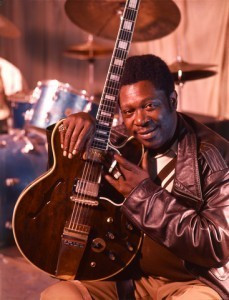My first encounter with the magic of B.B. King was at the Orpheum in Omaha, Nebraska, a memory etched vividly from when I was just fifteen. Having already been to several blues performances, this concert was different—it was transformative. B.B. King didn’t just play music; he channeled emotion. He captivated the entire audience, speaking to us through his soulful voice and then seamlessly continuing the conversation with his guitar. The way he bent those strings, the vibrato he employed, it was as if his guitar, a beautiful extension of himself, was vocalizing the stories his singing voice left untold. This profound connection between B.B. King and his instrument sparked an immediate curiosity in me, especially the name he lovingly bestowed upon it: Lucille.
 B.B. King affectionately holding his iconic guitar Lucille before a 1972 performance, showcasing the deep connection between the blues legend and his instrument.
B.B. King affectionately holding his iconic guitar Lucille before a 1972 performance, showcasing the deep connection between the blues legend and his instrument.
Like many guitar enthusiasts, I wondered, “Why Lucille?” My father, a guitarist himself, owned many guitars, but none were ever given names. Naming an instrument, especially one that seemed to sing and speak, felt deeply personal and significant. This fascination with musicians naming their guitars has stayed with me. There’s almost always a compelling, intimate narrative behind it. For me, finding my Gibson SG led to naming it Bonnie, after my stepmother who passed away in 2015. We shared a love for Delta Blues, and she was so supportive of my slide guitar playing. Though she never got to see me perform live, every time I pick up Bonnie, I think of her and our shared musical bond.
But the question remains, and it’s one that resonates with countless fans: why did B.B. King call his guitar “Lucille”? The story of how B.B. King named his beloved guitar Lucille is as captivating as his music. It’s a tale of bravery, a little bit of chaos, and a lasting tribute. As B.B. himself recounts in this engaging YouTube video, the name Lucille originated from a near-disastrous nightclub fire. During a performance, a fight broke out, and a fire erupted in the club. In the ensuing panic, B.B. King evacuated, but then realized he had left his prized guitar inside. He bravely ran back into the burning building to rescue it.
Later, B.B. King discovered that the fight that caused the fire was over a woman named Lucille who worked at the club. From that day forward, he decided to name his guitar “Lucille” as a reminder to never again risk his life for a guitar, and also as a symbol of the incident’s impact. This story adds another layer to the mystique of B.B. King and his guitar. Lucille wasn’t just an instrument; it was a symbol of resilience, passion, and the blues legend’s incredible journey. The story of Lucille is more than just a quirky anecdote; it’s an integral part of the B.B. King legacy, forever linking his name to the iconic “B B King Guitar” known and loved around the world.

